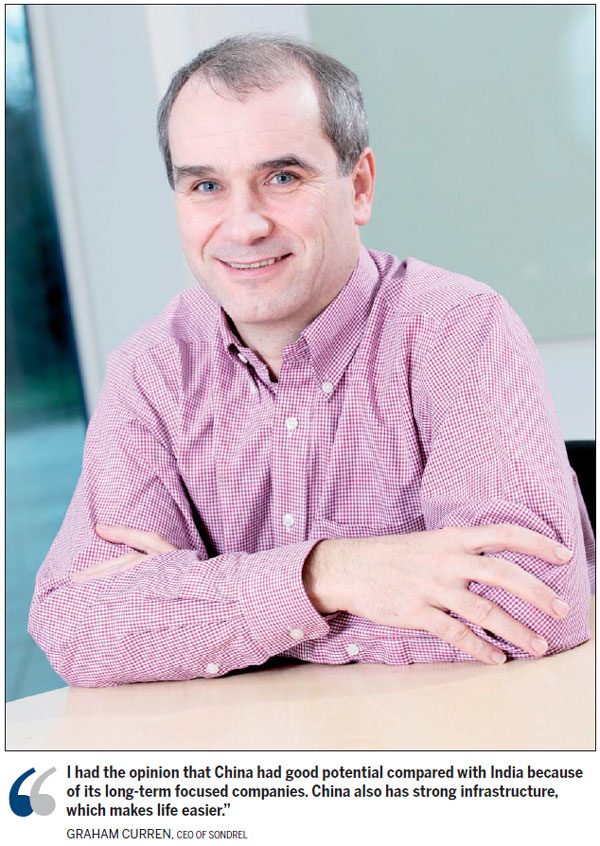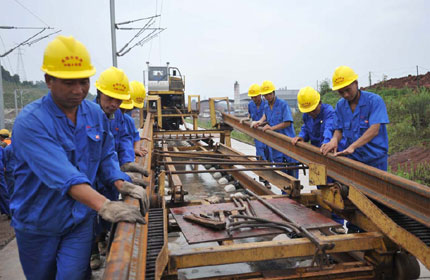Minnow flourishes in Chinese waters
Updated: 2014-06-27 07:33
By Cecily Liu (China Daily Europe)
|
|||||||||||

Courage of small UK business transforms its fortunes
Venturing into China can be a daunting proposition for a small or medium-sized business. A British semiconductor designer faced the challenge head on six years ago, and its move has transformed the company.
Starting from an office in Xi'an, Sondrel has since expanded to Shenzhen and Shanghai, serving a wide range of Chinese technology companies.
It now has almost 100 engineers in China, two-thirds of the company's global total. Even though it is only an SME, it has also invested greatly in an integrated circuit design training program in partnership with the University of Nottingham Ningbo Campus to help upgrade skills for Chinese graduates.
When Sondrel entered China in 2008, six years after the company was founded, it employed 40 people worldwide, compared with 150 now. It is almost constantly hiring more talent. Over the past 12 years, the company says, it has grown an average of 13 percent a year, much higher than the economic growth of Europe.
Those achievements have allowed Sondrel to win the rising star category of this year's Cathay Pacific China Business Awards.
Recalling the events of a few years ago, CEO Graham Curren says Sondrel's success in China today was far from assured when the company initially ventured out.
"At the time, we were finding it quite hard to hire engineers in Europe. We were also facing increasingly tough competition from American companies outsourcing in India, so we looked at how we could have an engineering base in Asia."
Many top engineering graduates from British universities are international students and need to return to their own countries rather than staying, he says. Strict British rules on work visas do not help.
"Last year we did a recruitment round to hire about three or four graduates in the UK, and it turned out the best three or four are all Chinese. It was unplanned, but because we couldn't get visas for them to stay here, they've gone back to China."
He looked at China and India, and opted for China after realizing the country's technology industry has great potential for growth and the supply chain for the semiconductor industry is more complete than that of India.
"I had the opinion that China had good potential compared with India because of its long-term focused companies. China also has strong infrastructure, which makes life easier."
The base that Sondrel initially set up in Xi'an had a design center that served the company's existing customers in Europe, but after a year it started to look into emerging opportunities brought on by the growth of China's technology companies, Curren says.
Xi'an was chosen because he wanted to base the office in a city unlikely to suffer the ups and downs of economic growth that bigger cities often face, and he saw the Xi'an government's investment in infrastructure as a positive sign.
The Shanghai and Shenzhen operations represented expansion largely at the request of customers who wanted Sondrel's engineers to be closer to their offices. Now Sondrel has about 70 engineers in Shanghai, 30 in Xi'an and a few in Shenzhen.
Curren says the growth of Sondrel's employee numbers in China has helped the firm employ more in Britain and on the Continent.
This is because Sondrel's growth in China has allowed the company to take on more projects and customers, and more workers in Europe were needed to communicate details and support European clients in the same time zone.
Some advanced and highly skilled tasks are still carried out in Europe by employees with more extensive experience because most Chinese engineers are still much younger and are learning many lessons through practice.
"We partition projects, so having the base in China made us more competitive, and that allowed us to hire more in the UK.
Curren says China's IT industry is still developing, and the prospects are good because already many big companies are emerging on the international scene, including the likes of telecommunications firms Huawei and ZTE, and computer brand Lenovo.
In addition, many smaller companies and start-ups are rapidly filling the market, he says.
But at the same time, Curren says, in some ways China's technology industry lags Western markets and other emerging powers like India, and one big problem is the lack of experienced engineers.
The integrated circuit program Sondrel has developed with the University of Nottingham's Ningbo campus aims to tackle this problem by cultivating more engineering talent and giving Chinese graduates more industrial experience before they start work.
"We produced a very focused training course, where students work 12 hours a day, gaining experience in how to use technical tools," Curren says.
For an SME like Sondrel, the collaboration is a big investment, as Curren's team had to produce the technical syllabus and provide the teaching. The first group of more than 40 students started its program a year ago, and the second group is about to start class.
Some of the students finishing the course have joined Sondrel in China, and some have gone to other companies, but all have found jobs, Curren says.
Beside his work at Sondrel, Curren is also a director of the China Britain Business Council. In this capacity, he is contributing his know-how about China to help other British companies venture into the rapidly growing but challenging Chinese market.
China is still a difficult market for SMEs because they often lack the budget to hire the best advisers to help them understand China's cultural and regulatory differences, and have to handle these problems themselves, he says.
At the same time, organizations such as the business council are rapidly expanding in China and the help they can provide is increasingly extensive.
"The type of help available now was perhaps not available when we first went to China."
In his role at the council, Curren has come across many British SMEs venturing into China. He says SMEs normally find it much harder to reach out to distant markets because their capacity to adapt to new environments is limited.
"I find that most SMEs either have no contact or experience outside the UK. They have a vision of China that does not fit in with reality. Language and culture are still challenges for them."
An example of big corporations having an easier time in entering China is their ability to obtain financial support from local governments when they set up operations in an industrial zone, which can be a long and difficult process, he says.
Curren says he always encourages British companies to visit China before doing business there because often their perception of the country will greatly change once they have seen it first hand.
"They all come back amazed, even people from Sondrel in the UK. They think we have Chinese engineers but they're not good, but they come back saying the Chinese engineers are really good. So I think people need to go and have a look."
Cecily.liu@chinadaily.com.cn
(China Daily European Weekly 06/27/2014 page20)
Today's Top News
China's top banks account for 32% of global earnings
HK chief poll has 'no legal standing'
Transformers 4 breaks records
China to increase personnel for peace
Over 1,200 Chinese evacuated to Baghdad
World Cup can damage health
Transformers helps growth in China
Prime London properties lure investors
Hot Topics
Lunar probe , China growth forecasts, Emission rules get tougher, China seen through 'colored lens', International board,
Editor's Picks

|

|

|

|

|

|





